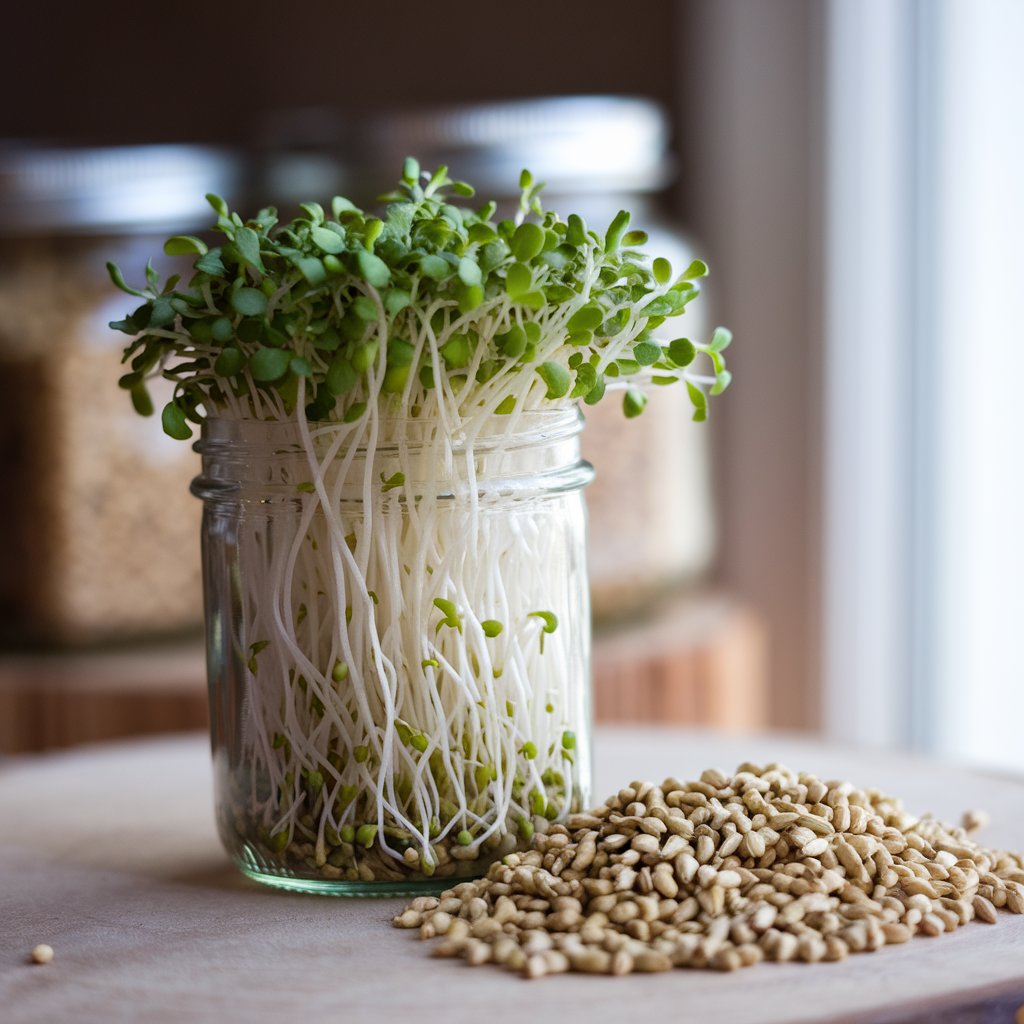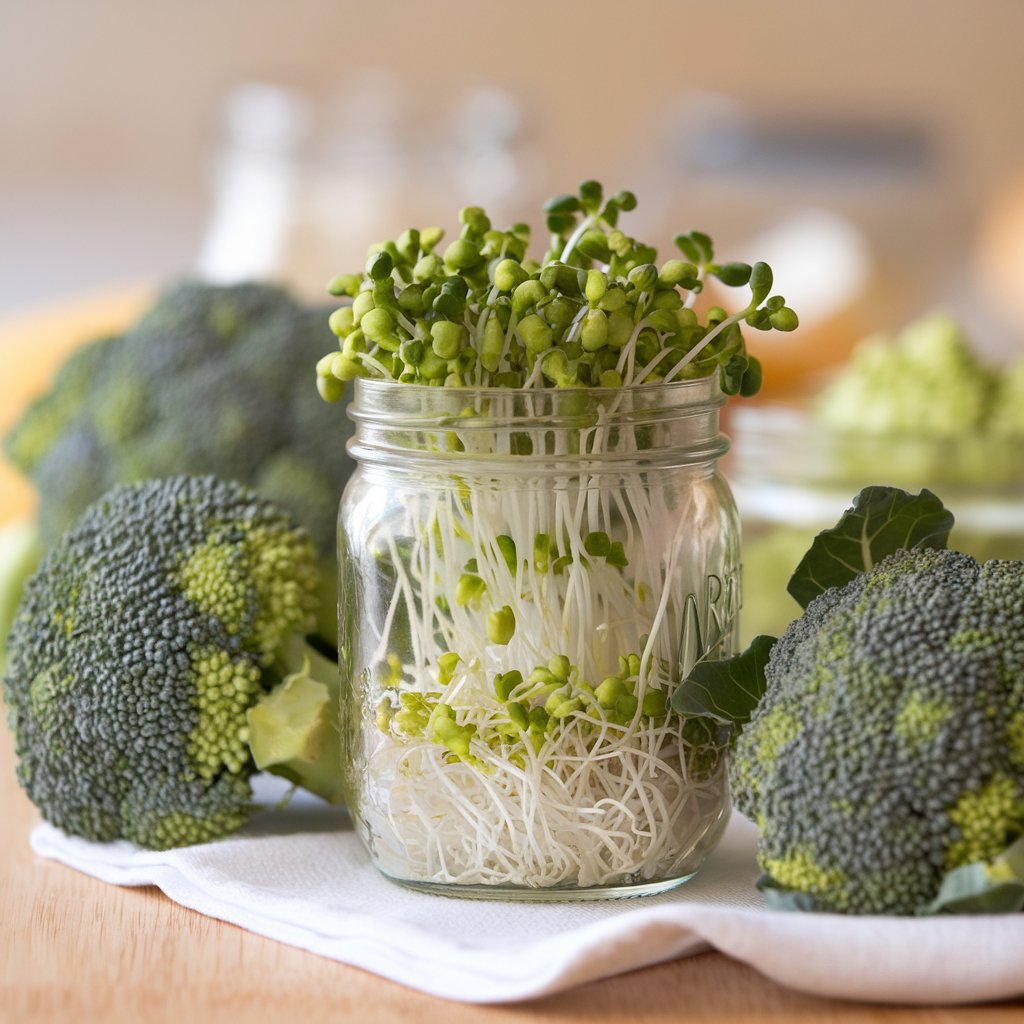Fenugreek sprouts, also known as “methi sprouts” have been praised for their unique health benefits and are increasingly popular among health enthusiasts. These tiny powerhouses are packed with nutrients, antioxidants, and various compounds beneficial for digestion, blood sugar regulation, and overall wellness. This article will guide you through sprouting fenugreek seeds at home, exploring their impressive health benefits, and breaking down their nutrition profile.
Why Fenugreek Sprouts?
Fenugreek, an herb native to Asia and the Mediterranean, is commonly used in its seed form for cooking and medicinal purposes. When sprouted, fenugreek seeds transform into a nutrient-dense superfood, making them even more beneficial for the body. Here’s why they’re worth adding to your daily diet:
- High in protein and fiber, essential for muscle and gut health.
- Contains powerful antioxidants to help fight inflammation.
- Support healthy blood sugar levels, making them ideal for people managing diabetes.
- Rich in vitamins and minerals, providing a natural energy boost.
How to Sprout Fenugreek Seeds at Home
Sprouting fenugreek seeds is a simple, cost-effective way to enjoy their fresh flavor and health benefits. Here’s a step-by-step guide to get you started:
Materials Needed:
- 1/4 cup of fenugreek seeds
- A glass jar or sprouting tray
- Clean water
- Cheesecloth or a breathable cover
Step-by-Step Instructions:
- Rinse the Seeds: Place the fenugreek seeds in a bowl and rinse them under cool water. This removes any dust or impurities.
- Soak the Seeds: Add the seeds to a jar and fill it with water. Soak them for around 8-10 hours or simply overnight. This process softens the seeds and activates germination.
- Drain and Rinse: After soaking, drain the water using a cheesecloth or sprouting lid. Rinse the seeds thoroughly and drain out the water.
- Sprout the Seeds: Place the jar on its side in a cool, dark area (avoid direct sunlight). Repeat the rinse and drain process twice a day to keep the seeds moist but not soaked. Within 2-3 days, you’ll notice tiny white tails sprouting from the seeds.
- Harvest: Once the sprouts have grown to about an inch, they are ready to be harvested. Give them a final rinse and store them in the refrigerator.They can remain fresh for up to a week.

Nutritional Profile of Fenugreek Sprouts
Fenugreek sprouts are rich in essential nutrients, making them a great addition to a balanced diet. Here’s a breakdown of the nutrients found in fenugreek sprouts per 100g:
- Calories: 50 kcal
- Protein: 4-5g
- Fiber: 3-4g
- Carbohydrates: 9-10g
- Fat: 0.6g (mostly healthy fats)
- Vitamin C: Boosts immune function and skin health
- Vitamin A: Supports vision, skin health, and immunity
- Iron: Essential for red blood cell production and energy
- Calcium: Supports bone health
- Magnesium: Aids in muscle and nerve function
Health Benefits of Fenugreek Sprouts
1. Improved Digestion
- Fenugreek sprouts are high in dietary fiber, which helps improve digestion by adding bulk to the stool and encouraging regular bowel movements. Fiber can also reduce the risk of constipation and promote a healthy gut.
2. Blood Sugar Regulation
- Research suggests that fenugreek may help lower blood sugar levels, making it beneficial for people with diabetes. The natural soluble fiber in fenugreek seeds slows down carbohydrate absorption, which can help in managing blood glucose levels.
3. Anti-Inflammatory and Antioxidant Properties
- Fenugreek sprouts are packed with antioxidants like flavonoids and saponins, which combat oxidative stress and inflammation. This can help reduce the risk of chronic diseases such as heart disease and arthritis.
4. Boosts Immune System
- The high vitamin C content in fenugreek sprouts supports immune health, helping the body fight off infections and promoting faster recovery from illnesses.
5. Supports Heart Health
- Fenugreek’s fiber, along with its antioxidant properties, supports heart health by reducing cholesterol levels. Regular consumption of fenugreek sprouts can help manage cholesterol, reducing the risk of cardiovascular diseases.
How to Add Fenugreek Sprouts to Your Diet
Incorporating fenugreek sprouts into your meals is easy and versatile. Here are some tasty ideas:
- Fenugreek Sprout Salad
- Toss fenugreek sprouts with cucumber, cherry tomatoes, diced onions, and a drizzle of olive oil. Sprinkle with salt and pepper for a refreshing, nutrient-dense salad.
- Smoothie Boost
- Add a handful of fenugreek sprouts to your morning smoothie. They pair well with fruits like bananas, berries, and a splash of almond milk, adding an extra nutrient boost without altering the flavor too much.
- Sandwich or Wrap Filling
- Use fenugreek sprouts as a fresh topping in sandwiches or wraps, combining them with ingredients like avocado, hummus, and shredded carrots.
- Fenugreek Sprout Hummus
- Blend a handful of fenugreek sprouts into your hummus recipe to add extra flavor and nutrients. The sprouts add a slightly bitter, earthy flavor that pairs well with garlic and lemon juice.
- Sprouts Stir-Fry
- Lightly stir-fry fenugreek sprouts with vegetables like bell peppers, carrots, and snap peas. Add your favorite seasonings, and enjoy this as a warm side dish.

Tips for Growing and Storing Fenugreek Sprouts
- Use Fresh Seeds: Ensure the seeds you’re using are organic and free from pesticides for the best sprouting results.
- Rinse Regularly: Rinse the sprouts twice a day to prevent mold and ensure they remain fresh.
- Store Properly: Store fenugreek sprouts in an airtight container in the fridge, where they’ll stay fresh for up to a week.
FAQs
Are there any side effects of fenugreek sprouts?
Fenugreek sprouts are generally safe to consume. However, those who are pregnant or have a history of allergies to fenugreek should consult a doctor before adding them to their diet.
Can I eat fenugreek sprouts daily?
Yes, fenugreek sprouts can be enjoyed daily. A small portion (1-2 tablespoons) is enough to gain their benefits.
Can I cook fenugreek sprouts?
Yes, you can lightly cook them by adding them to stir-fries or soups. However, cooking may reduce some of their nutrient content, so it’s best to eat them raw if possible.
Conclusion
Fenugreek sprouts are a nutritional powerhouse, loaded with vitamins, minerals, fiber, and antioxidants. Sprouting them at home is a simple process that yields a versatile, nutrient-packed ingredient perfect for salads, smoothies, and more. With numerous health benefits ranging from blood sugar regulation to heart health support, fenugreek sprouts are a valuable addition to any diet. Try incorporating them into your daily meals to experience the incredible benefits they offer.





Pingback: How to Eat Sprouts: The Best Times and Benefits